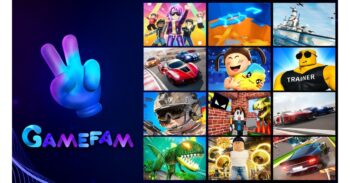By Gary Symons
TLL Editor in Chief
In 2022, The Licensing Letter did something that doesn’t happen very often; we created a new licensing category on our site.
As the original licensing publication, The Licensing Letter has seen a lot of fads come and go in the industry, but the metaverse is different. As new technologies allow platforms to create entire virtual worlds, and populate them with the avatars for millions of people around the world, the metaverse has created not just an alternate world, but an alternate economy as well.
Today, digital goods sell alongside physical goods, and top music stars are doing live concerts in the metaverse, along with their concerts IRL (In Real Life).
On Planet Earth, few companies understand that reality (or alternate reality) better than Gamefam. The studio is now the most successful developer of games and experiences on the Roblox platform, has grown to more than 180 employees, and at any given time has 150,000 to 200,000 users on their 30-or-so games at any given time.
More importantly, Gamefam got there because they understand the metaverse needs brands and licensing as much as brands and licensing need the metaverse.
Chief Business Officer Ricardo Briceno came to Gamefam after working as a brand manager for Mattel’s Hot Wheel’s brand. He says it’s the introduction of top brands to the metaverse that has helped attract both users and revenue, and at the same time, brands have massively increased their own fan base by working inside the metaverse.
 “I think that relationship most definitely goes both ways,” Briceno says. “IP and brands from the real world need to be in the metaverse to remain relevant, to reach these audiences that are spending time there.
“I think that relationship most definitely goes both ways,” Briceno says. “IP and brands from the real world need to be in the metaverse to remain relevant, to reach these audiences that are spending time there.
“At the same time, we know there’s a reason why SpongeBob has been around for 25 years, and Sonic has been around I believe it’s like 30 years now, because they are properties that resonate with audiences across multiple generations.
“Having that IP that communities love to engage with is important for the metaverse because otherwise, the metaverse is not delivering the true value that people get from real life.”
Briceno also says that for brand managers, learning about the metaverse audience is a new and critical skill that is getting more important every year, simply because hundreds of millions of people are moving onto metaverse platforms.
“Really, if brands are asking, why should I be in the metaverse, the answer is that’s where the audience is today,” Briceno points out.
Key to that understanding, he adds, is that a large percentage of that audience is made up of younger people who grew up in the metaverse, and see nothing strange about hanging out in that digital world.
“I think what’s interesting is that we older people … and I’m not even that old … try to define this difference between the metaverse and real life,” Briceno explains. “In reality, for Gen Alpha, there really isn’t any difference. They just move between both worlds without necessarily thinking about it, because both of those aspects are part of their daily lives.
“Yeah, they may hang out at school with friends, or go to soccer practice, but later they’re jumping onto Roblox or whatever and hanging out with their friends. So, the metaverse isn’t just about gaming or experiences; it’s really the next evolution of social networks where people interact and do things together.”
Before Gamefam was founded, its CEO Joe Ferencz and Briceno worked together at Mattel, with Ferencz being the Manager, Franchise Business Development. Having looked into Roblox, Ferencz and Briceno could see the potential both for brands, but also identified a key problem that became the seed for Gamefam.

“We saw what we believed was the next frontier for kids after YouTube and video social media (like TikTok), but we also saw there really wasn’t a way for any one or any brands to easily get into Roblox,” Briceno said. “If we wanted to bring Hot Wheels into Roblox for example, there was no easy way to do that, and that was the first inkling that there was an idea for a business here.”
The friends launched Gamefam in 2019, and today it is the world’s most successful metaverse developer and strategist. Gamefam now has roughly 30 games in its portfolio, and has also expanded to Minecraft and Fortnite.
In some cases Gamefam has launched games or experiences based on its own IP, but with deep experience in licensing, the company has also been successful in developing collaborative games with top brands like SpongeBob SquarePants, Teenage Mutant Ninja Turtles, Barbie, Hot Wheels, Sonic, and Cirque du Soleil, among others.
As a brand manager himself, Briceno says the biggest question brands need to ask themselves what it is they are trying to achieve. In many cases, brands will first say they want to create a game inside Roblox, but that’s not always the best answer.
“Our conversations tend to start, ‘Okay, we understand you want to be on Roblox, but what are you trying to accomplish?’ Tell us about your goals because, sure, a lot of times the answer is let’s make a game, but a lot of other times it’s doing something different or even a combination of things,” Briceno explains. For example, what about integrating into an existing game that might have up to 3 million daily visits a day.”
That, in fact, is why licensing is so vital to the foundation of the metaverse. Developers may create great games or experiences, but it’s often the brands that help create a viable business model, so the relationship is often very positive for both sides.
“If you’re trying to deliver high engagement at one specific point in time, it’s probably best to align with games that already have that audience, because what’s really powerful about the metaverse from a brand activation point of view is that it’s very active engagement,” Briceno says. “Unlike video, where you’re passively watching and enjoying, and you might be commenting, with gaming you’re actively doing something in a way that the metaverse or UGC (User Generated Content) gaming can essentially deliver the same impact that experiential marketing does. It’s more memorable, so it has more impact.”

A good example of trying something more experimental than simply putting up a game could be seen in Gamefam’s work for the Super Bowl.
“So, we’re working with Warner Music, and we’re working with the NFL,” Briceno recalls. “Warner Music wanted to do concerts and the NFL wants to do something big, but we’re not sure what.
“So, we brought them together, and decided to make the first Super Bowl concert on Roblox, which to this day remains the number one rated concert on Roblox a year later. It won multiple awards, and reached over seven million people.
“That’s an example of when none of us had all the answer, but the clients were willing to come in, try things out, experiment, and things ended up working out very well.”
“There are those who still believe the metaverse is just a fad that will never grow beyond a niche in the gaming world, but Briceno tells brands the metaverse is not only here to stay, but will grow in importance.
“I guess there are really three trends that I, as someone working in this area, would tell people,” Briceno says.
“The first is that the metaverse is here, and it’s here to stay, because it is one of the most important ways in which Gen Z and most importantly Gen Alpha form communities and socialize.
“The second is that, as a result, brands and IP will continue to grow their presence in the metaverse in order to truly drive brand engagement,” Briceno said. “It’s much like what happened with YouTube, in that this intellectual property is vital to YouTube, and in return, having a presence on YouTube became increasingly important, and really, critical for brands to remain relevant.
“And number three is that there definitely will be more platforms coming,” Briceno predicts. “There will be more innovation, more platforms will arise, and that will change how and where this type of engagement happens, but the overall concept of UGC gaming and the metaverse is only just starting to really grow, and it will continue to expand very rapidly.”
